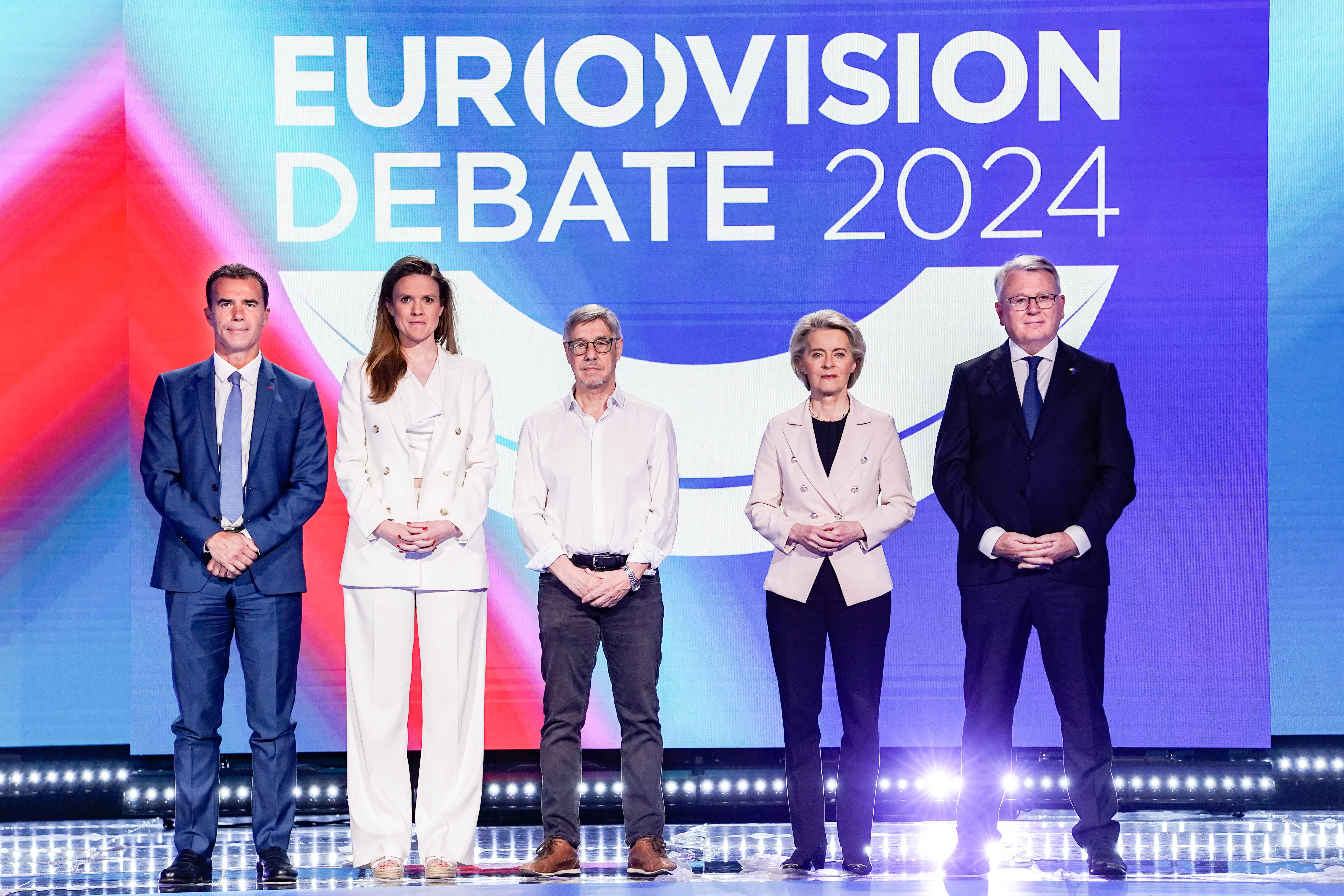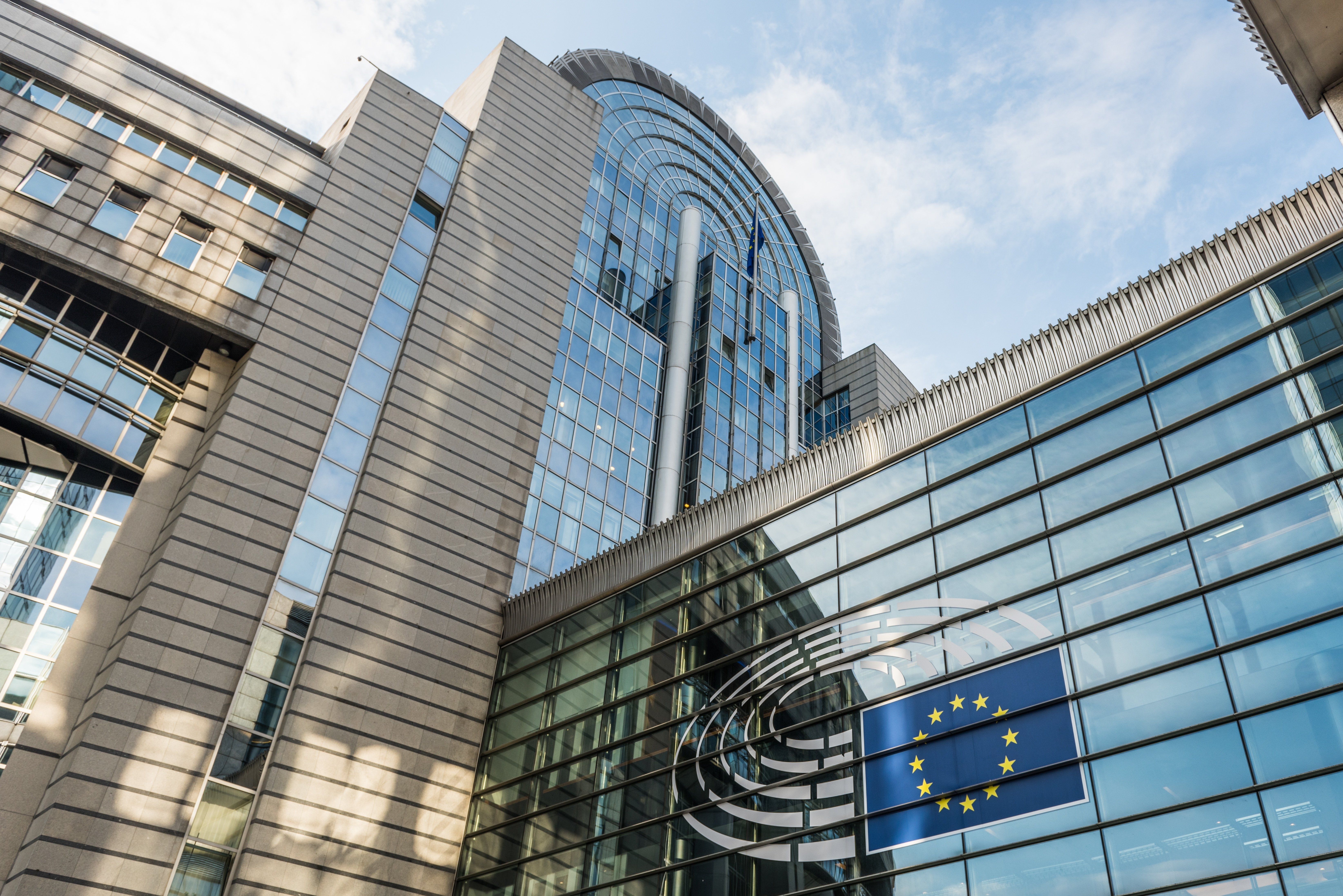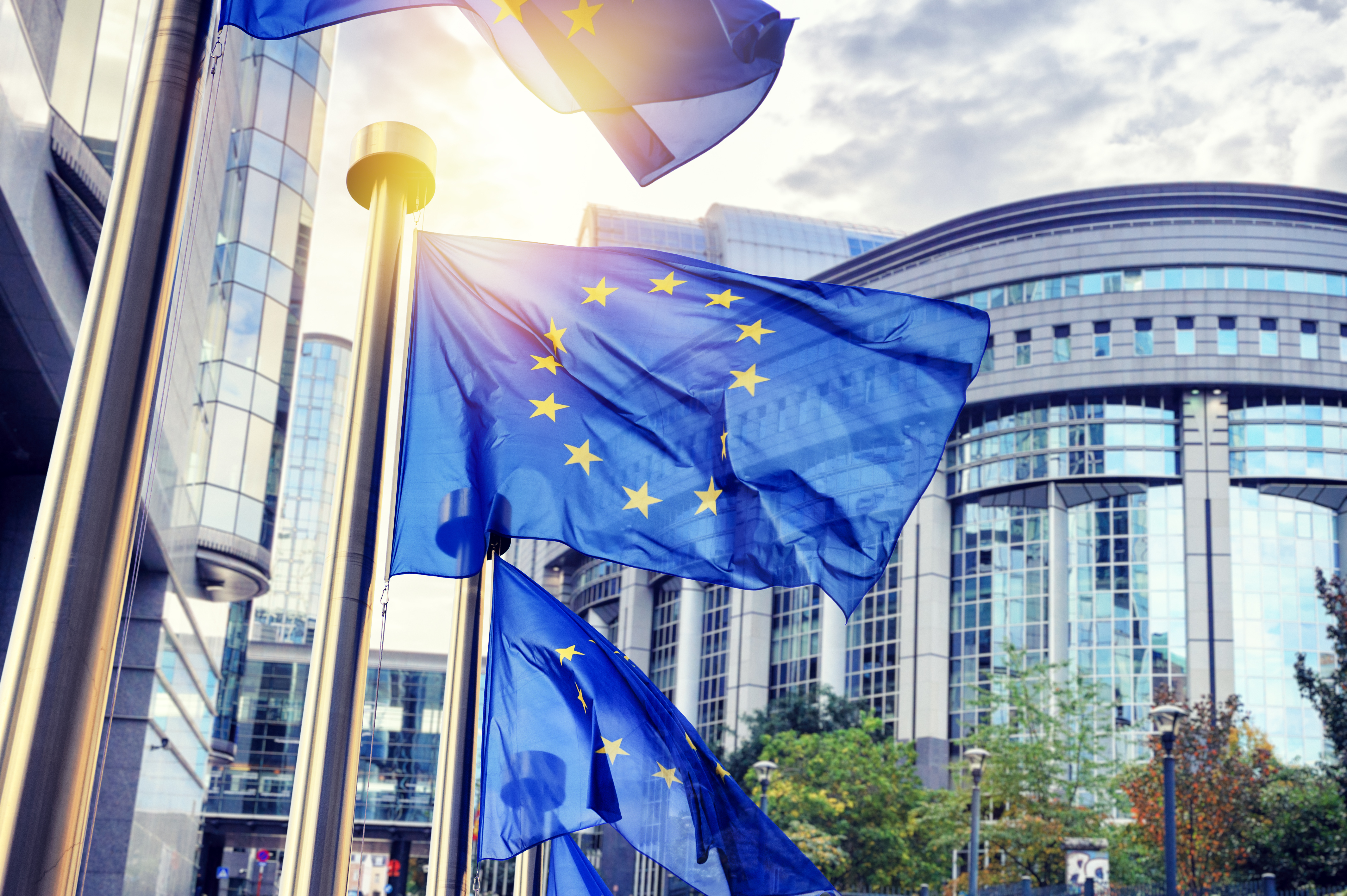Commission President candidates clash in "Spitzenkandidaten" debate
by Emma Vivian on 28 May 2024
In advance of the European Parliament elections between 6 and 9 June, the candidates from five of Europe's major political groupings debated one another across a wide range of issues, including the economy, the climate and the environment, and technology policy on 23 May 2024. This briefing provides a summary of the key points each candidate made during the debate.
Background
The "Spitzenkandidaten", or "lead candidate" system, is the process through which the European Union selects the President of the European Commission. It was first introduced in 2014 to increase the involvement of European citizens, and to facilitate party cohesion under a single candidate and a common agenda during election campaigns. Each European political party nominates a lead candidate for the position of President of the European Commission ahead of the European Parliament elections. The nominated lead candidates campaign across the EU, presenting their visions and policies.
However, someone can become President of the European Commission even if they were not a lead candidate in the European Parliament elections. The Spitzenkandidat process suggests that the European political party winning the most seats should have its lead candidate considered for the Commission presidency, but this is not binding. The European Council, consisting of EU Member States' leaders, proposes a candidate for the Commission presidency, taking election results into account but not being obligated to choose the lead candidate. The nominated candidate must then be approved by a majority of the Members of the European Parliament (MEPs). The European Council can nominate someone outside the Spitzenkandidat process if they believe that person is more likely to secure majority support in the Parliament or better address political considerations. An example of this happening is the nomination and approval the current President of the European Commission Ursula von der Leyen, who was not a lead candidate.
Please note that the European Conservatives and Reformists (ECR- far-right), and Identity and Democracy (ID- radical euroskeptic) refused to nominate a lead candidate and therefore did not participate in the debate.
Debate structure
The five candidates are: Walter Baier (Austria, European Left), Sandro Gozi (Italy, Renew Europe Now), Ursula von der Leyen (Germany, European People’s Party- EPP), Terry Reintke (Germany, European Greens) and Nicolas Schmit (Luxembourg, Party of European Socialists- S&D).
The candidates debated the following topics: Economy and Jobs, Defence and Security, Climate and Environment, Democracy and Leadership, Migration and Borders and, Innovation and Technology. The debate also centred on political alliances and the rise of far-right parties in the European Union. Although right-wing and radical parties were not present, the candidates clearly articulated their positions on forming an alliance with them. Each candidate had 45 seconds per topic, plus three extra opportunities to ask a question to another candidate or intervene after their 45 seconds had passed. The order in which the candidates spoke was randomly chosen one week before the debate.
Candidates
Walter Baier (Austria, European Left)

Economy and Jobs
During the debate, Baier emphasised that rising housing prices and rents are exacerbating poverty in Europe. He advocated for the European Union to introduce a directive to implement rent caps and prohibit evictions from private housing. This, he argued, would address the root causes of poverty more effectively than other measures. While Baier supported the principle of EU enlargement, he stressed that it should primarily benefit the working people. Any enlargement should respect workers' rights and labour standards to ensure that the process is equitable and beneficial for all involved.
Climate and Environment
Baier highlighted the need for an efficient and green economy. He called for a new industrial and energy model, rejecting austerity measures that hinder investments in the green transition. Significant investments are necessary to facilitate this transition, and these investments should not be stifled by restrictive financial governance. He underlined the importance of an ecological transition, advocating for policies that would make the economy more sustainable.
Innovation and Technology
During his speech, Baier praised the Digital Services Act (DSA) for providing safeguards against harmful content while balancing public freedoms. He raised concerns about the monopolistic tendencies of big tech companies and underlined their tendency towards profit-driven data harvesting. He proposed that information and communication technologies should be managed as public goods controlled by society, ensuring that technology serves the public interest. He stressed the importance of regulating big tech companies to protect citizens, particularly children and adolescents, from harmful content and data exploitation. He called for the strict enforcement of the DSA to ensure that these platforms adhere to high standards of accountability and transparency.
Alliances
Baier underscored the Left's opposition to any alliance with far-right parties, emphasising the importance of standing with citizens and upholding democratic values. He confirmed that the Left would be wary of an alliance with the EPP if it were to ally with the ECR group. Baier also took aim at Sandro Gozi for the People's Party for Freedom and Democracy (VVD)’s collaboration with the far-right in the Netherlands and emphasised that he opposes the inclusion of the far right’s agenda in the Commission’s programme.
Sandro Gozi (Italy, Renew Europe Now)

Economy and Jobs
Sandro Gozi highlighted the need for a more democratic and powerful Europe. He emphasised the importance of reforming the EU to unify the continent, suggesting an increase in the EU budget and rethinking the European project's structure. Gozi stressed the need to create opportunities for all European citizens by enhancing the EU's competitiveness.
Climate and Environment
Gozi underscored the importance of ensuring a green and competitive Europe while remaining firm on the fact that "green fatigue" (the sentiment of being tired by environmentally focused policies) is not an option. He advocated for the importance of clean technologies, pragmatic dialogue with various stakeholders, and making the single European market more sustainable. In response to a question on the circular economy, he underscored the importance of the right to repair, fighting planned obsolescence, and banning greenwashing. Gozi’s statements focused on empowering consumers to drive sustainability.
Innovation and Technology
Gozi addressed the importance of protecting people online while embracing innovation. He highlighted the need to ensure that major digital platforms comply with regulations and protect users, especially minors, suggesting that internet access should be restricted for those under the age of 15. Gozi also stressed the importance of transparency in influencer marketing and advocated for continued regulation to safeguard user data and mental health.
Alliances
In response to questions about alliances with right-leaning parties, Gozi emphasised the importance of joining forces to advance democratic values. He expressed concerns about right-wing parties' anti-European sentiments and emphasised Renew's commitment to promoting a more democratic and powerful Europe. When challenged about the Dutch liberal party VVD (a member of the Renew group) being willing to form a coalition with the far-right party PVV, he was firm in underlying that as there is no official government in the Netherlands as of yet, this situation will be addressed after the European elections.
Ursula von der Leyen (Germany, European People's Party)

Economy and Jobs
Von der Leyen committed to creating quality jobs and improving living conditions across the Union. She emphasised the importance of a skilled workforce and she underscored the commitment of the EPP to focus on skills. When asked about the pension system and other welfare measures she underlined that during her mandate as President of the European Commission her administration supported workers through policies such as the minimum wage and substantial investments in infrastructure and human capital, adding that more targeted policies are the responsibility of Member States.
Climate and Environment
Von der Leyen described how Europe reached the Green Deal, reaffirming the EU's commitment to climate neutrality by 2050 (a goal that is now codified in the law). She noted that the legal framework and roadmap are already in place, and it is now time for implementation. She highlighted the role of clean technology, stating that Europe is leading in this area and must continue to do so. Von der Leyen described the Green Deal as a strategic growth initiative, noting that last year, Europe produced more electricity from wind than from gas. She emphasised that the economy has grown under this strategy, balancing economic growth with environmental sustainability. During her speech on the Green Deal, Ms von der Leyen also addressed farmers' concerns about environmental regulations, advocating for a shift from “conditionality (a principle of EU law by which the EU can withhold funds from Member States who do not meet certain standards) to incentives”. She mentioned the use of drone technology, as a means to streamline reporting and control measures, making them more efficient and less burdensome for farmers.
Innovation and Technology
Von der Leyen discussed the careful approach taken with the Data Act and the AI Act to foster growth and innovation while mitigating risks. She stressed that there is a lot of potential behind new technologies, but also that Europe was the first region in the world to regulate these areas, maintaining a balance between innovation and safety. In response to concerns about TikTok and its impact on young people, von der Leyen mentioned an ongoing investigation into TikTok Lite and its potential effects on mental health. She highlighted Europe's ability to leverage regulations effectively, as evidenced by the swift market withdrawal of TikTok Lite following a recent Commission investigation.
Alliances
This was the most contentious topic for von der Leyen, as the other candidates were critical of her willingness to form a coalition with the European Conservatives and Reformist (ECR) party. Von der Leyen emphasised that she would form alliances based on three principles: being pro-Europe, pro-Ukraine/anti-Putin, and pro-rule of law. She will reject alliances with ECR members that support Putin or undermine European values, stressing the importance of upholding these principles in the formation of the Parliament. The other candidates were critical of her stance, criticising in particular her collaboration with Italian far-right party Fratelli d’Italia (FdI) and prime minister Giorgia Meloni. Von der Leyen argued that her role as president is to collaborate effectively with everyone. She noted that Meloni is clearly pro-European, anti-Putin, and pro-rule of law, which aligns with the principles that von der Leyen believes should guide the European Parliament.
Terry Reintke (Germany, European Greens)

Economy and Jobs
Reintke underscored the importance of harmonising economic success with environmental sustainability. She argued that the perceived contradiction between economic growth and climate action must be dismantled. To achieve this, she proposed significant investments in the future, focusing on the development of common infrastructure across Europe, strategic investments in green technology, and actions to increase skills in the workforce. Reintke emphasised the importance of supporting companies in their green transformation efforts, advocating for policies that create equal opportunities for all.
Climate and Environment
Reintke passionately supported the European Green Deal, proposing a comprehensive Green Industrial Deal to capitalise on opportunities in green technology. She called for a thorough reform of agricultural policy to ensure farmers receive adequate support and can sustain themselves financially. She emphasised the need for equitable subsidies and substantial investment in European infrastructure to achieve sustainability. She addressed backlash from farmers by advocating for pragmatic and supportive policies to facilitate the green transition.
Reintke argued that immediate investment is crucial to prevent higher future costs, stressing the importance of concrete, actionable policies to garner public support for the green agenda.
Innovation and Technology
Reintke argued that digital platforms must take responsibility for their content, emphasising that mere legislation is not sufficient without rigorous enforcement. She advocated for AI to be human-centred, ensuring that technological advancements prioritise human welfare and ethical considerations. Reintke stressed the importance of enforcing digital regulations to protect citizens while fostering innovation. She called for a balanced approach that embraces technological progress while safeguarding public interest and maintaining stringent standards for digital platforms.
Alliances
Reintke criticised forming alliances with far-right parties, arguing that this goes against European principles and could undermine the Union’s achievements in recent years.
Nicolas Schmit (Luxembourg, Party of European Socialists)

Economy and Jobs
Mr Schmit underscored the importance of reducing poverty by providing people with the right opportunities and good job prospects. Schmit emphasised that investing in people is crucial, as a skilled workforce is essential for a robust economy. He highlighted his party's commitment to improving living conditions for EU citizens, particularly by ensuring access to quality jobs and enhancing social services.
Climate and Environment
Schmit argued that the right climate policy can stimulate sustainable growth but acknowledged that it comes with costs. He stressed the need for decarbonising industry, agriculture, and daily life, ensuring that climate policies are acceptable and beneficial for everyone, including people and companies. Schmit called for involving social partners in the climate transition to ensure that the benefits are widely shared and that everyone can be a winner with the right climate policy.
Innovation and Technology
Schmit praised the EU for being a frontrunner in AI regulation, arguing that technology should drive growth and social progress. He emphasised the need for increased investment in technology, green tech, and talent from around the world. Schmit called for policies that encourage startups and support the right financial environment through a capital markets union. He stressed the importance of maintaining the momentum of the Green Deal with proper financing to ensure a sustainable and innovative future for Europe.
Alliances
Schmit expressed his refusal to work with parties, like ECR and ID, that do not share common EU values, particularly in areas such as misinformation, women's rights, and media freedom. He highlighted the need for political clarity and unambiguity to uphold EU values effectively.
Topics: European Politics, EU, Europe






Comments